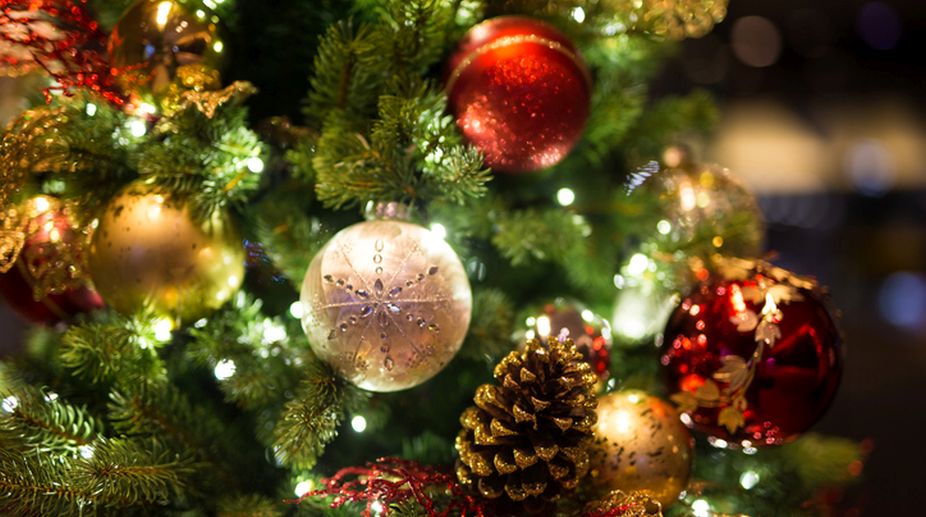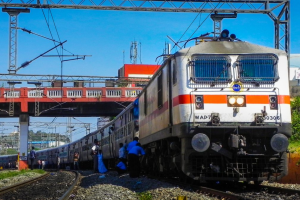This Christmas, I found myself reminiscing about past years when I celebrated this special day in Calcutta with gusto and gaiety like most Bengalis. I realised once again that most of the elders in my family with whom I celebrated Christmas are no more. Now all I have are fond memories of those precious moments, which are indelibly etched in my mind.
I recalled how fun-filled my Christmas was when my parents used to take my younger brother and me to the Barrackpore Club, a private club nestled on the banks of the Ganges, where both Indian and English members would come together to celebrate Christmas with much pomp and splendor. For several years the Santa Claus at the Barrackpore Club was a white man of generous girth who would arrive at the club in a horse-drawn carriage adorned with Christmas ornaments.
Advertisement
I would wait with bated breath in an enormous hall, where all the children congregated, for my turn to go up toSanta to receive my Christmas gift. In his inimitable English accent, Santa would announce the name of the child whose turn it was to go up; sometimes Santa would butcher our names so badly that an Indian club member had to come to his assistance, pronouncing the name correctly for him. I remember trembling in fear and awe as I walked up to this massive Englishman with rosy cheeks and a booming voice to receive a huge hug and my gift.
The gifts that we received were ever so thoughtful, ranging from quiz books, chemistry sets to ping pong bats and balls, and more. I was quite disappointed when I had my first encounter with the new Santa who replaced the Englishman; he was a Bengali gentleman, one Mr. Banerjee, who not only came in an old rickshaw instead of the usual horse-drawn carriage (due to lack of funds), but also happened to be our family friend. For me, all the mystery and the magic surrounding Christmas and Santa were gone. Much to my dismay, I also found out that my parents were actually paying for the gifts and choosing them for us; Santa had no hand in this gift giving ritual other than handing over our gifts.
I often celebrated Christmas or Boro Din, as the Bengalis call it, with my uncle and aunt and my cousins in their bungalow within the premises of a jute mill in Barrackpore. My cousin and I would get up early in the morning on Christmas day to go out looking for a Christmas tree. We were always lucky to find something that served the purpose. Once we got the tree in the house, we would have a delightful time decorating it with beautiful ornaments. And to simulate snowflakes, my uncle cut white paper into snowflakes and pasted them on the glass windows.
When it was evening, he would turn off the lights in the living room where the Christmas tree was while keeping the Christmas lights on, which lent a magical glow. My aunt, who was admired in our family for her culinary skills, prepared for us traditional English fare consisting of soup, mutton roast, sautéed vegetables, salad, and her pièce de résistance: caramel custard.
My Christmas was certainly not confined to Barrackpore. I enjoyed my visits to the iconic Park Street, which was always adorned with Christmas lights while the sidewalks were decked with Santa Claus and Nativity scenes. Hordes of people of all classes and creeds converged on Park Street to enjoy the sights and sounds of Christmas. Calcuttans, regardless of faith, attended the midnight mass at the historic St. Pauls Cathedral where the inspirational sermons were delivered that were about loving-kindness and compassion for our fellow beings. It was a time marked by grace, warmth, kindness and, more importantly, openness to other cultural traditions.
Even in those days, there were lines inside Flurys for their famous plum cakes, fruit cakes, chicken patties, and tortes; the staunch loyalists braved the snarled-up traffic to pay a visit to their favorite bakery, Nahoums, for stickjaws, macaroons, walnut and plum cakes, and fruitcakes.
The traffic was still quite chaotic but nothingcompared to what we experience now. There were no serpentine lines like the ones now found in front of famous eateries such as Bar-B-Q, Mocambo or Peter Cat. But years ago, I recall gingerly navigating through the vast throngs on Park Street while my ears were constantly being assailed by the cacophony of sounds of traffic. Even this madness could never dampen my enthusiasm for Christmas.
Calcutta had something of a magical quality during the festive season with many people scrambling to be in the right place to be seen, whether that be a ritzy hotel, plush restaurant, or a posh club.
Many Calcuttans sported their Sunday best as they ventured out of their homes to partake in the Christmas spirit. The prestigious clubs of Calcutta, of which there were many, strictly enforced an antiquated dress code, possibly from colonial times when men had to wear either a suit or a sports coat with a tie and shoes to match, while the women were expected to wear saris or western dress.
During my college days in the 1970s, I often accompanied my parents to the Christmas Eve parties at the Calcutta Club. To enliven things, there was always a band with a crooner singing English pop songs of the 1960s and 70s while folks danced away until the wee hours of the morning. Being of a shy disposition and never possessing the temerity to ask a young lady for a dance, I spent most of the time observing men and women in their sartorial splendor.
I remember how amusing it was for me to spot men in their mismatched, outlandish clothes and accessories. My other distraction on that night was gorging on the Christmas delicacies such as roast turkey, ham, mutton and duck, and the sinfully delicious desserts. My favorite dessert was the Christmas pudding. The conversations were always polite and respectful; there were no arguments or disagreements.
Everybody seemed interested in what you had to say. Perhaps it was the liquor which flowed freely that put the folks in a convivial spirit. Sadly, after leaving India in the early 1980s I never got to enjoy all the merrymaking that Christmas in Calcutta involved. Christmas in the United States is a private affair. There are no Christmas parties in hotels or country clubs like we have here.
On Christmas day, most shops and businesses are closed and one is hard pressed to find people on the streets, which take on a dismal and deserted look. On any given street one will find homes decorated with Christmas lights with hardly a soul to be seen anywhere. The families are all indoors enjoying this special time with their immediate family and very close friends.
Coming from Calcutta, where theres so much energy on Christmas Eve and Christmas day, Christmas in the United States was colorless and dull for me. I distinctly remember how terribly lonesome and homesick I was when I had first arrived as a graduate student in the United States in the early 1980s with no place to go to celebrate Boro Din.
There were no parties at the clubs or hotels; no crooners belting out English pop songs; no Nahoums or Flurys to indulge your cravings for delectable dainties and certainly no throbbing, pulsating excitement that I experienced in Park Street. Those days most international students like me didn't have the luxury to fly back to India during Christmas holidays, which many rich Indian kids seem to do these days. So many of my Christmases were spent reminiscing about those special moments I shared with my family and friends in Calcutta during the festive season.
I can't think of any city in the world where there is a civil celebration of every conceivable religious festival. It just shows how cosmopolitan the spirit of Calcutta is. While Westerners may know about Jewish festivals, they don't have a clue about Eid, or Buddha Jayanti let alone Diwali, and there is hardly any celebration of nonChristian religious festivals. It is in this city, which is often described by many Westerners as chaotic, poor, and polluted that we see a real cosmopolitan spirit.
In my opinion, it's the only city where everyone is embraced with warmth and conviviality, which is simply unmatched. In spite of the alarming tendency all over India to embrace a narrow, nativistic, and exclusive kind of nationalism built around Hindu ideology, Calcutta has not given up on its rich tradition of tolerance and respect for all religions. Neither have the myriad problems that Calcuttans encounter dampened their joie de vivre. Such is the magical charm of my beloved city Calcutta.
The writer is professor of communication studies, Loyola Marymount University, Los Angeles. He can be reached at Aroy2@lmu.edu











